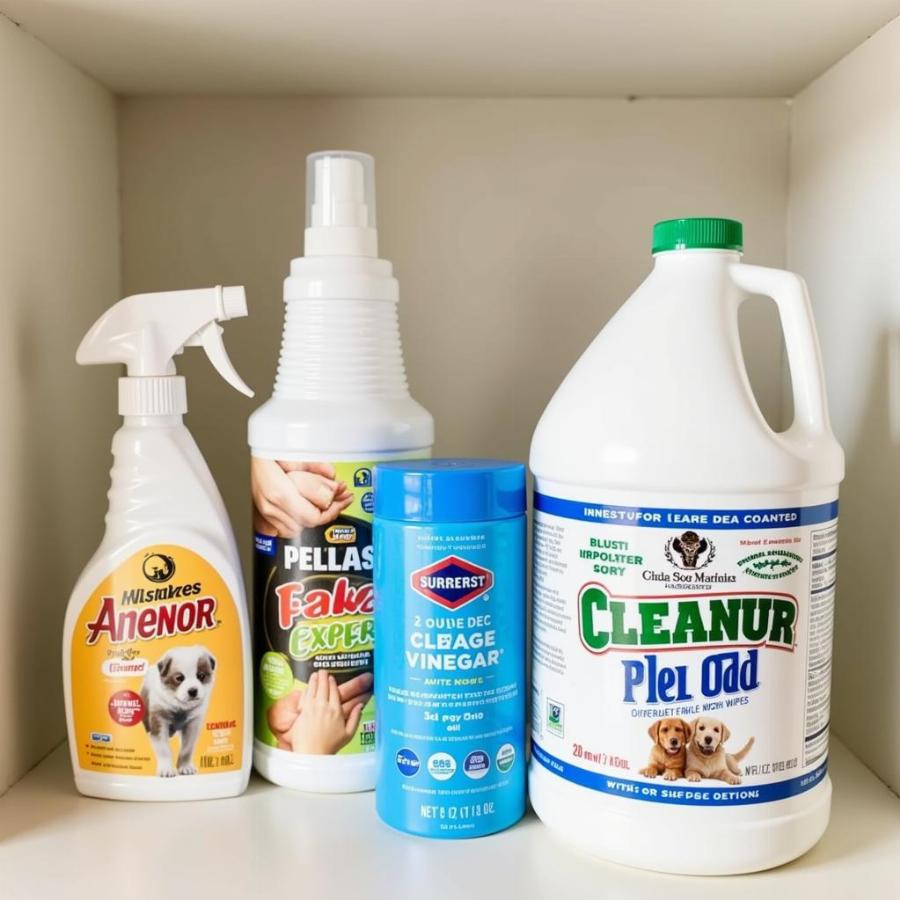Borax, a common household cleaner, is often touted for its cleaning power. But is borax dangerous for dogs? The short answer is yes. While it might seem like a natural cleaning solution, borax can pose serious health risks to our canine companions. This article will delve into the dangers of borax exposure for dogs, explain the signs of borax poisoning, and offer safe cleaning alternatives for pet owners.
Understanding the Dangers of Borax for Dogs
Borax, also known as sodium borate, is a naturally occurring mineral often used in cleaning products, insecticides, and even some cosmetics. While generally considered safe for humans in small amounts, it can be toxic to dogs if ingested, inhaled, or absorbed through the skin. Even small amounts of borax can cause irritation, while larger doses can lead to severe poisoning. This is because dogs metabolize borax differently than humans, making them more susceptible to its toxic effects. The severity of the reaction depends on factors like the dog’s size, age, overall health, and the amount of borax they’ve been exposed to.
Signs of Borax Poisoning in Dogs
If you suspect your dog has been exposed to borax, it’s crucial to watch for signs of poisoning. These symptoms can range from mild to severe and can manifest quickly. Some common signs include vomiting, diarrhea, lethargy, loss of appetite, tremors, excessive drooling, and seizures. In severe cases, borax poisoning can lead to kidney failure, liver damage, and even death.
What should you do if your dog exhibits these symptoms? Immediate veterinary attention is critical!
What to Do If Your Dog Ingests Borax
If your dog ingests borax, do not induce vomiting unless specifically directed by a veterinarian. Instead, contact your vet or the ASPCA Animal Poison Control Center immediately. They can advise you on the best course of action based on your dog’s specific situation. Time is of the essence in cases of borax poisoning, so swift action is crucial.
Safe Cleaning Alternatives for Pet Owners
Fortunately, there are plenty of safe and effective cleaning alternatives that won’t put your furry friend at risk. Many pet-safe cleaning products are available commercially, specifically formulated to be non-toxic to animals. You can also make your own cleaning solutions using natural ingredients like vinegar and baking soda. These options are not only safer for your pets but also environmentally friendly.
Natural Cleaning Solutions for a Pet-Friendly Home
- Vinegar and Water: A simple solution of equal parts white vinegar and water can be used to clean floors, countertops, and even windows.
- Baking Soda Paste: Mix baking soda with a small amount of water to create a paste for scrubbing tough stains and deodorizing carpets.
- Lemon Juice: Lemon juice is a natural disinfectant and can be used to clean and freshen surfaces.
 Pet-Safe Cleaning Products
Pet-Safe Cleaning Products
Preventing Borax Exposure in Dogs
Prevention is always better than cure. Here are some tips to keep your dog safe from borax exposure:
- Store borax and all cleaning products out of reach of your dog, preferably in a locked cabinet.
- After cleaning with borax, ensure the area is thoroughly rinsed and dried before allowing your dog access.
- Consider switching to pet-safe cleaning products altogether.
- Be mindful of borax-containing products used in other areas of your home, such as laundry detergents or pest control products.
Is Boric Acid the Same as Borax?
While often confused, boric acid and borax are not the same, although they are related. Both are derived from boron, but boric acid is a more refined form. Boric acid is also toxic to dogs and presents similar risks. Therefore, the same precautions should be taken to prevent exposure.
Conclusion
Borax, while a useful cleaning agent, poses a significant danger to dogs. Understanding the risks and taking preventative measures is crucial for responsible pet ownership. By choosing pet-safe cleaning alternatives and being vigilant about storage, you can create a safe and healthy environment for your beloved canine companion. Remember, if you suspect your dog has been exposed to borax, contact your veterinarian or the ASPCA Animal Poison Control Center immediately.
FAQ
- What is the most dangerous way for a dog to be exposed to borax? Ingestion is the most dangerous form of exposure, as it allows the borax to be directly absorbed into the dog’s system.
- Can borax be used in areas where dogs roam freely? It’s best to avoid using borax in areas accessible to dogs. If used, ensure the area is thoroughly cleaned and rinsed afterwards.
- Are there any home remedies for borax poisoning in dogs? No, there are no home remedies. Veterinary care is essential.
- What are the long-term effects of borax poisoning in dogs? Long-term effects can include kidney and liver damage.
- How can I tell if a cleaning product is pet-safe? Look for products specifically labeled as “pet-safe” or consult your veterinarian.
- Is borax dangerous for other pets? Yes, borax can be toxic to other pets, including cats and small animals.
- What should I do if I spill borax on my dog’s fur? Rinse the affected area thoroughly with water and contact your veterinarian if any irritation occurs.
Introducing Beaut Dogs
Beaut Dogs is your trusted source for all things related to dog care, offering expert advice and valuable resources to help you provide the best possible care for your canine companion. From breed information and health tips to training guides and product recommendations, we’re here to support you every step of the way. For personalized guidance and answers to your specific questions, please contact us at Email: [email protected]. We’re happy to help! Beaut Dogs is committed to providing reliable and up-to-date information to help you navigate the wonderful world of dog ownership. Visit https://beautdogs.com today to learn more!